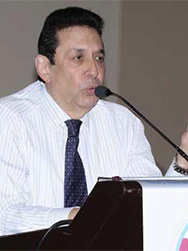
The Pragmatic Idealist
Rotarians were eager to listen to Keki Mistry, the Managing Director of HDFC Ltd, share his thoughts on Corporate Governance, and even more eager to get him to answer their questions. Even after the meeting was adjourned, many queries remained unanswered, but the speaker was able to lend us his perspective on India Inc., a perspective that can be best summed up as pragmatically idealistic.
Keki Mistry, along with his position as Managing Director, is also one of the 21 members of the Kotak Committee that was set up in 2017. The members of this committee are mandated by SEBI to ensure that all organisations recognise a certain standard of regulatory norms that have come to be defined as Corporate Governance. He believes that “India Inc. is proceeding on the right path and establishing best practices in governance.” However, governance in India has a unique flavour, and he does “believe that regulators are taking this into consideration while framing new laws and regulations.”
As a word of caution, he suggests that India’s transformation into a more developed economy must not be hindered by corporate governance norms that are stringent, overbearing, and restrictive as that would inhibit a company’s ability to take risks and contribute to economic growth. “Relentless helicopter style parenting and regulation can create a scenario that is more harmful than beneficial,” the speaker pointed out.
A misguided attempt to focus too much on compliance issues at board meetings, at the cost of devoting sufficient time to long term strategy and growth is, in his opinion, a recipe for disaster. The board needs to oversee compliance, but it shouldn’t lose sight of its primary objective, which is framing and overseeing a long term sustainable strategy. Thus, in summarising his thoughts about the future, he said: “I’m confident that corporate governance practices in India will keep improving, which enable easier access of capital from global markets, increase transparency, and enhance investor confidence.”
The reason that his speech sounded idealistic was because it was delivered right after a very recent example of bad Corporate Governance – The Nirav Modi Case. Therefore, it shouldn’t have been surprising for him when this query came up: “Where would you like the debate of NPAs (Non-Performing Assets) and similar frauds to end?”
“Personally if you ask me, and I’m giving you a personal viewpoint (which is not necessarily an HDFC viewpoint), the NPAs in the banking system have been there for years. I don’t think the situation today is any worse than what it was five years ago.” It’s just the way that NPAs are classified, today, is far more stringent than five years ago. According to this banker, everything five years ago was being brushed underneath the carpet. However, the RBI is now forcing banks to disclose all the NPLs, even perceived NPLs. This means that when “a stress is perceived,” these loans have to be classified as non-performing loans, and the appropriate provisions are to be made.
In conclusion, Keki Mistry suggests a better solution to the problem of non-performing loans and assets. “We’ve identified a whole number of problem loans, but unless we find a solution to these loans, what is the point of identifying more and more cases?” He asks. He believes that the problem is to find a solution, instead of just identifying more and more cases. Besides, “I think the privatisation of public sector banks makes sense.” Although that pragmatism is of no use considering the loss of jobs that would be the outcome of privatisation, it is still a happy thought that opens the gates of idealism.
